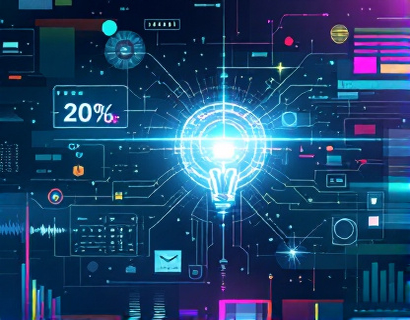Transforming Digital Experiences: The Synergy of Crypto and AI
The intersection of cryptocurrency and artificial intelligence (AI) is giving rise to a new era of digital innovation, where user engagement and satisfaction are reaching unprecedented levels. This fusion is not just about combining two advanced technologies but about creating a seamless, secure, and highly personalized digital experience. As we delve into this topic, we will explore how these technologies are reshaping the tech ecosystem, focusing on connectivity, growth, and enhanced user satisfaction through advanced solutions.
Understanding the Basics: Cryptocurrency and AI
Cryptocurrency, often referred to as digital or virtual currency, uses cryptography for security and operates on a decentralized network, typically a blockchain. This technology ensures transparency, immutability, and security in transactions, eliminating the need for intermediaries like banks. On the other hand, AI involves the simulation of human intelligence processes by machines, particularly computer systems. These processes include learning (the acquisition of information and rules for using it), reasoning (using rules to reach approximate or definite conclusions), and self-correction.
The integration of AI into cryptocurrency systems brings about a transformative impact. AI algorithms can analyze vast amounts of data to predict market trends, optimize trading strategies, and enhance security measures. Conversely, the decentralized and secure nature of cryptocurrency provides a robust platform for AI applications, ensuring data integrity and user trust.
Enhancing Connectivity through Blockchain and AI
One of the most significant advancements in the crypto-AI synergy is the enhancement of connectivity. Blockchain technology, with its distributed ledger, allows for seamless and secure communication between different systems and devices. AI, with its ability to process and interpret complex data patterns, can optimize these connections, making them more efficient and reliable.
Smart contracts, self-executing contracts with the terms directly written into code, are a prime example. AI can automate the execution of these contracts based on predefined conditions, reducing the need for manual intervention and minimizing errors. This not only speeds up processes but also enhances trust and transparency in transactions.
Personalization and User Engagement
Personalization is a key driver of user engagement in the digital space. AI algorithms can analyze user behavior, preferences, and patterns to deliver tailored experiences. In the context of cryptocurrency, this means creating customized investment portfolios, personalized wallet interfaces, and targeted educational content. Such personalization not only enhances user satisfaction but also increases the likelihood of user retention and growth.
For instance, AI-driven recommendation systems can suggest cryptocurrencies based on a user's investment goals, risk tolerance, and market trends. This level of customization ensures that users feel understood and valued, fostering a stronger connection with the platform.
Security and Trust through AI and Crypto
Security is a paramount concern in the digital world, and the combination of AI and cryptocurrency offers robust solutions. AI can detect and mitigate threats in real-time by analyzing patterns and anomalies in data. Machine learning models can identify potential security breaches before they occur, enhancing the overall security posture of crypto platforms.
Moreover, the transparency and immutability of blockchain ensure that all transactions are recorded and verifiable. AI can further enhance this by providing advanced analytics to monitor and audit transactions, ensuring compliance and reducing the risk of fraud. This dual approach not only protects user assets but also builds trust in the ecosystem.
Decentralized Finance (DeFi) and AI
Decentralized Finance (DeFi) is a revolutionary financial system built on blockchain technology, offering traditional financial services without intermediaries. AI plays a crucial role in optimizing DeFi protocols, making them more efficient and accessible. For example, AI can enhance lending and borrowing platforms by predicting creditworthiness, automating loan approvals, and managing risk.
AI-driven trading bots can navigate complex DeFi landscapes, executing trades based on real-time data and market conditions. This not only democratizes access to financial services but also provides users with advanced tools to manage their assets effectively. The synergy between AI and DeFi is paving the way for a more inclusive and dynamic financial ecosystem.
Enhancing User Experience through AI-Powered Interfaces
The user interface (UI) and user experience (UX) are critical components of any digital platform. AI can significantly improve these aspects by creating intuitive and adaptive interfaces. For instance, natural language processing (NLP) enables voice and text-based interactions, making it easier for users to navigate and manage their crypto assets.
AI can also optimize UI elements based on user behavior, ensuring that the most frequently used features are easily accessible. Personalized dashboards, real-time notifications, and context-aware suggestions are just a few ways AI enhances the user experience. This level of personalization not only makes the platform more user-friendly but also increases user engagement and satisfaction.
Market Analysis and Decision Making
One of the most compelling applications of AI in the crypto space is market analysis. AI algorithms can process and analyze vast amounts of data from various sources, including news feeds, social media, and market reports. This comprehensive analysis helps in identifying trends, predicting price movements, and making informed investment decisions.
AI-powered analytics tools can provide real-time insights, helping users stay ahead of the market. For example, sentiment analysis can gauge public opinion and market sentiment, while technical analysis can identify patterns and trends in price movements. These insights are invaluable for both novice and experienced investors, enhancing their decision-making capabilities.
Challenges and Considerations
While the integration of AI and cryptocurrency offers numerous benefits, it also comes with challenges. One of the primary concerns is the regulatory landscape. The decentralized nature of cryptocurrency and the complex algorithms of AI can make it difficult to navigate regulatory requirements. Ensuring compliance while innovating is a delicate balance that platforms must maintain.
Another challenge is the technical complexity. Both AI and cryptocurrency are sophisticated fields, and integrating them requires a high level of expertise. Platforms must invest in skilled teams and robust infrastructure to develop and maintain these advanced solutions. Additionally, there is the issue of data privacy and user consent, which must be handled with utmost care to maintain trust.
Future Prospects: The Evolution of Crypto and AI
The future of the crypto-AI synergy is promising, with ongoing advancements poised to further transform the digital landscape. As AI algorithms become more sophisticated, their ability to analyze and act on data will improve, leading to more accurate predictions and efficient systems. The development of quantum computing, for instance, could revolutionize AI capabilities, enabling even more complex and powerful applications.
In the crypto space, the evolution of blockchain technology, such as the introduction of layer 2 solutions and cross-chain interoperability, will enhance the scalability and efficiency of decentralized systems. The integration of AI with these advancements will create a more seamless and robust ecosystem, benefiting users and developers alike.
Moreover, the rise of central bank digital currencies (CBDCs) and their potential integration with AI could redefine financial systems globally. AI can optimize the management and distribution of CBDCs, ensuring stability and efficiency in the monetary system.
Conclusion
The fusion of cryptocurrency and AI is not just a technological trend but a fundamental shift in how we interact with digital systems. This synergy is driving innovation, enhancing user engagement, and creating a more secure and personalized digital experience. As the tech ecosystem continues to evolve, the role of AI in the crypto space will become increasingly significant, paving the way for a future where connectivity, growth, and satisfaction are seamlessly intertwined.










































